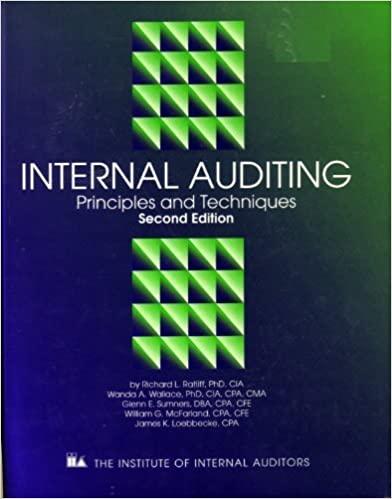Question
ABC Company Balance Sheet Actual December 31, 2019 (in $000s) Assets Liabilities & Shareholders Equity Cash $ 40,000 Accounts payable (days 35) $ 9,200 Accounts
ABC Company
Balance Sheet
Actual December 31, 2019 (in $000s)
Assets Liabilities & Shareholders Equity
Cash $ 40,000 Accounts payable (days 35) $ 9,200
Accounts receivable (days 90) 46,850 Long-term debt 30,800
Inventory (days 50) 13,150
Buildings and equipment 150,000
Accumulated amortization
Buildings and equipment (50,000) Common shares 100,000
Retained earnings 60,000
$200,000 $200,000
ABC Company
Forecasted Balance Sheet
December 31, 2020 (in $000s)
Assets Liabilities & Shareholders Equity
Cash $ 9,300 Accounts payable (days 47) $ 13,000
Accounts receivable (days 95) 52,000 Long-term debt 42,000
Inventory (days 50) 13,700
Buildings and equipment 205,000
Accumulated amortization
Buildings and equipment (55,000) Common shares 100,000
Retained earnings 70,000
$225,000 $225,000
During 2020, ABC Company (ABC) is expected to have a net income of $20,000,000 and has a 50% dividend payout ratio. The company desires to have a minimum cash level of $10,000,000. This goal was 5% of its 2019 total assets. Cash has not been adjusted in the forecast for 2020. Depreciation and amortization of $5,000,000, new equipment purchases of $55,000,000 and interest expense of $2,000,000 was included in the 2020 forecast. The condensed income statements for forecasted 2020 and actual 2019 are as follows (in $000s):
2020 2019
` Sales $200,000 $190,000
Cost of sales (variable COGS) ( 80,000) ( 76,000)
Fixed costs in COGS (incl. Dep) ( 20,000) ( 20,000)
Other Fixed costs (incl. Interest) ( 60,000) ( 60,000)
Taxes ( 20,000) ( 16,000)
Net income $ 20,000 $ 18,000
XYZ Company (XYZ) is considering buying ABC Company for $180,000,000 to $200,000,000 at the beginning of 2020. XYZ financing of the purchase is outside the scope of this case. Also, the price of the company should not be more than 4 times Earnings before Interest Taxes, Depreciation and Amortization (EBITDA).
The CFO of XYZ will only recommend buying if ABC has positive operating cash flows, maintains a current ratio of minimum 1:1, has a maximum interest bearing debt to equity ratio of 0.3:1, has reasonable cash levels and other key operating ratios are trending positively. XYZ requires a 10% WACC in accepting investments and at least a 13.33% return for equity holders. The XYZ CFO thinks, as well, that maintaining a cash level of 45 days fixed costs could be prudent for ABC Company and/or a line of credit should be pursued.
Question #2
- Prepare a ratio analysis for ABC Company calculating four (4) relevant ratios for 2019 and 2020, and separately, analyze the impact of days in 2020 versus 2019. Note: the ratios must address potential XYZ Companys CFO concerns to be relevant. (10 marks)
- Discuss how ABC Companys performance matches potential investor expectations? (4 marks)
- What is the EBITDA based intrinsic value of ABC Company using 2020 data? What is the EBITDA margin trend (EBITDA divided by Sales)? (3 marks)
- Overall, is the financial state of ABC Company, improving, deteriorating or stable and why, and would you buy ABC Company. Note: only use data you calculated in this question. (3 marks)
Step by Step Solution
There are 3 Steps involved in it
Step: 1

Get Instant Access to Expert-Tailored Solutions
See step-by-step solutions with expert insights and AI powered tools for academic success
Step: 2

Step: 3

Ace Your Homework with AI
Get the answers you need in no time with our AI-driven, step-by-step assistance
Get Started


